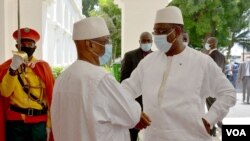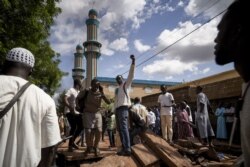The leaders of West Africa’s ECOWAS bloc concluded a summit on Mali by calling for the immediate resignations of 31 parliamentarians whose contested elections in March triggered the country’s political crisis.
The 15 heads of state, meeting online Monday, did not request the resignation of embattled Mali President Ibrahim Boubacar Keita. Instead, in a statement read by Niger’s President Mahamadou Issoufou, the group’s chair, they demanded an array of reforms aimed at restoring peace in the country.
The recommendations issued by ECOWAS give both sides ample room to claim victory and save face.
First, the resignations would include that of the speaker. The statement suggested parliament should be able to function with its remaining 116 members.
Second, the leaders ordered “a rapid and total overhaul” of the constitutional court, as well as establishment of a power-sharing agreement under “a government of national unity” with Keita at the helm but with the opposition and civil society included.
In addition, ECOWAS called for a formal investigation into the deaths of protesters in Bamako, Mali’s capital, since the uprisings started some three months ago.
The government says 11 people have died in clashes with security forces since July 10. Opposition groups put the number of fatalities at 20 or more.
ECOWAS set a deadline of Aug. 7 for its plan to be implemented, under penalty of sanctions.
“We have agreed to solemnly call all Malians, in their diversity, to start to protect their country from serious peril,” the statement said. “We have in particular committed to avoid violence and favor dialogue.”
Imam Mahmoud Dicko, who calls himself the protesters’ moral leader, said Keita should stay in power but must improve governance, fight corruption and stop inter-ethnic killings.
Last Thursday, the presidents of Niger, Nigeria, Ghana, Ivory Coast and Senegal went to Bamako to meet with Keita to try to forge a plan. After hours of closed-door discussions, they decided to hold the virtual summit.
"Our wish is to see these different proposals meet the approval of the various stakeholders of the situation in Mali," the statement explained.
Critics of ECOWAS contend its members protect one another and so won’t demand the resignation of IBK, as Keita is colloquially known. Now 75, he was first elected in 2013 and won a second term in 2018.
His opponents – gathered in the June 5 Movement-Rally of Patriotic Forces (M5-RFP) coalition of political figures, religious leaders and civil society groups – have been calling for his resignation, claiming that he has become unfit to lead the West African nation that is battling insecurity, corruption and poverty.
“The president is strongly contested because he has let his people down,” said Niankoro Yeah Samaké, a former presidential candidate who is part of the coalition. Therefore, he added, “he should step down.”
Samaké made those comments in an interview Sunday with VOA.
This report originated with VOA Bambara, part of the agency’s French to Africa service.






